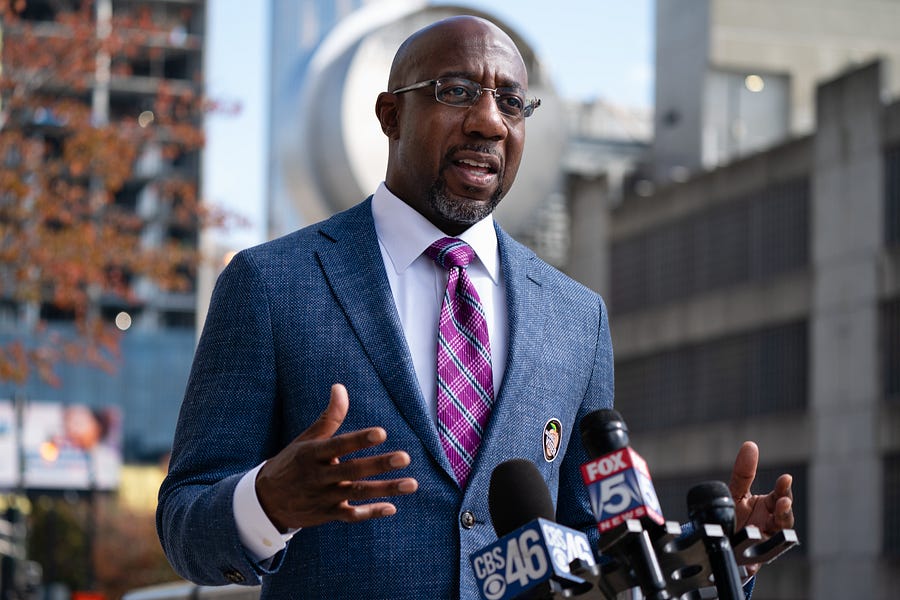In hindsight, Amy Coney Barrett likely became an inevitable Supreme Court nominee on September 6, 2017. That’s the day when California senator Dianne Feinstein said to Barrett (then an obscure Notre Dame law professor up for a seat in the Seventh Circuit court of appeals), “The dogma lives loudly within you, and that’s a concern.”
In that moment—in part because of Feinstein’s apparent introduction of an unconstitutional religious test for public office and in part because of Professor Barrett’s calm and poised response—a conservative legal star was born. Even now, more than three years later, you can buy “the dogma lives loudly within you” merchandise. I googled it yesterday:

And so, when President Trump nominated Judge Barrett to the Supreme Court, conservatives stood ready to defend her from renewed attacks on her faith. I defended her then, and I defended her now. I dedicated one of my Sunday newsletters to explaining why her membership in a charismatic Catholic group called “People of Praise” was no cause for concern.
In fact, Republicans didn’t just stand ready to defend Barrett. They were spoiling for a fight. Many Republicans were eager to prove a point—Democrats are intolerant of conservative Christians, and they’re willing to violate the Constitution to block a faithful Catholic from public office.
Fast-forward the political debate one month. Raphael Warnock is the senior pastor of Ebenezer Baptist Church in Atlanta, and he preaches from one of the most famed pulpits in America—where Martin Luther King Jr. once preached. He’s also challenging Republican senator Kelly Loeffler in a Georgia runoff that may well determine control of the Senate. And now his religious beliefs are under fire, and the people taking aim at Warnock are some of the same individuals who rallied to defend Barrett from Democratic and media attacks on her faith.
The core critique centers around a 26 second clip of a sermon, shared and condemned by Senator Marco Rubio:
Senators Tom Cotton and Marsha Blackburn circulated the same clip and called for Warnock to drop out of the race. Republicans are painting him as a religious radical, a devotee of the same progressive theology as Barack Obama’s controversial pastor, Jeremiah Wright.
Apparently, the dogma lives loudly within Pastor Warnock.
Is this attack on Warnock fair? Are these Republicans hypocrites? And, more importantly, how should voters factor in a politician’s religious beliefs when casting a vote?
First, let’s connect Warnock’s statement to the biblical context. He’s referencing Matthew 6:24, one of the most famous verses in the Bible:
No one can serve two masters, for either he will hate the one and love the other, or he will be devoted to the one and despise the other. You cannot serve God and money.
And now here’s Warnock’s quote:
America, nobody can serve God and the military. You can’t serve God and money. You cannot serve God and mammon at the same time. America, choose ye this day who you will serve. Choose ye this day.
As I read Warnock’s statement, it’s a fairly conventional statement of Christian belief. He’s questioning where your ultimate loyalty lies.
I’ve sat through countless sermons on Matthew 6:24. I’ve heard the sermons that confine themselves to discussing God or money, but I’ve also heard the “two masters” concept extended in many different ways—you can’t serve God and your employer, or God and athletics, or God and sex. And in these sermons, you won’t hear that there is no place at all for these other things, but rather that their place is subordinate to God’s. There is only one master.
That’s exactly how Warnock defended his statement, telling an online press conference that the sermon “was about priorities and about how one orders your priority so that you can live a moral life.”
For example, no one hearing that sermon would believe he’s arguing that a person shouldn’t build a business, take a job, or make any money (on his website, Warnock notes his father was a “a veteran, a small businessman, and a preacher.”) But making money is not the object of your life. It pales in comparison to following Christ. The same logic applies to any competing earthly priority, including military service.
I will admit that I’ve never heard “God and the military” in the two masters sermons I’ve heard in conservative churches, but it’s not because the concept isn’t just as true, but rather because conservative Evangelical churches rarely “go there.” Progressive churches and pastors will. In fact, it sometimes feels as if there is an Eleventh Commandment in many conservative American churches, “Thou shalt honor the military.”
But let’s suppose for a moment that Warnock is a pacifist, and he truly believes that Christians shouldn’t serve in the military. Is that a reason for him to drop out of the race, as senators Cotton and Blackburn demand? Should he be condemned and reviled for that belief?
Not at all. There is an ancient and honorable tradition of Christian pacifism. As a theological matter, I disagree with it, but I respect it.
Republicans need to be very careful about condemning religious beliefs that are outside of the secular political mainstream. After all, the majority of Americans don’t hold to conservative Evangelical ideas about sexual morality, salvation, or the complementary roles of men and women in church and the family.
Yet Republicans are united in the idea that it’s intolerant to attempt to exclude traditional conservative Christians from public office because of their religious beliefs—or even to condemn them as extremists or immoral. To turn around a demand that a Christian pastor of a different church with different beliefs withdraw from politics because of his theology and his sermons are outside of the mainstream in a way that favors the GOP is indeed hypocritical.
But that’s not the end of the inquiry. There still remains the rather important reality that religious beliefs can drive both policy and conduct in office. We all ground our policies and conduct in a particular world view, whether it’s located in a secular philosophy or a religious theology. So if there are unfair ways of evaluating a person’s faith, there are also fair questions we can ask.
Here’s what’s unfair: disqualifying a Christian judge because he or she believes that sex is reserved for marriage between a man and a woman. Here’s what’s fair: disqualifying a Christian judge if he or she declares they would not uphold or apply constitutional statutes or regulations protecting LGBT Americans from workplace discrimination.
Or, here’s what’s unfair: disqualifying a Christian candidate because he believes that Christian people should prioritize service to Christ over service to the nation. Here’s what’s fair: disqualifying a Christian candidate because he would dramatically underfund the military or fail to vote to defend the nation from external attack.
And here’s what’s religious ignorance (and sometimes outright bigotry): assuming that a person who pledges to uphold the law or to defend the nation is lying simply because you believe “they’re defying the principles of their faith.”
So yes, ask Pastor Warnock about American military spending, American military policy or about support for veterans. Ask him if his beliefs would require him to vote against military intervention no matter the stakes. But don’t assume you know the answer to those questions based on 26 seconds of a single sermon—especially when those 26 seconds easily match with conventional Christian beliefs.
It’s a simple reality that religious beliefs often seem strange or inexplicable to those outside the faith (or even outside a specific denomination). And when you’re not steeped in a specific theology, you often have no idea how it will play out in political philosophy. I’m a Christian in the Calvinist reformed tradition, for example, yet I have vigorous public policy disagreements with many of my Calvinist friends.
So here’s the best solution—rather than presuming to dictate what another person’s faith means in public life, let him explain it himself, and evaluate him on that basis.
For example, let’s go right back to where we started. Last week Justice Barrett came under fire for failing to stay the execution of Orlando Hall, a man condemned to die for raping and murdering a Texas teenager. Here’s a tweet from a prominent priest critiquing Barrett:
But this ignores how Justice Barrett herself sees the lawful role of the Supreme Court justice in American life. It’s not to implement Catholic teaching in American law. If Justice Barrett served in the Senate, she might vote to abolish the federal death penalty—and she might even locate her moral opposition in her Catholic faith—but she’s not a senator. She’s a judge, and judges interpret the law. They are not supposed to craft the law according to their own moral code.
And now let’s go back to Pastor Warnock. Last week he tweeted this:
Here he connects faith (his identity as a pastor) to specific public policy (defending abortion rights). The tweet provides a perfectly valid reason for opposing him, and it’s based in public policy, not his faith. I don’t truly care where Warnock grounds his support of abortion rights—whether it’s based on secular philosophy or a particular theology—it’s the output of that philosophy or theology that concerns me the most.
If Pastor Warnock would underfund the military, oppose him on that basis. If he would undercut support for veterans, oppose him on that basis. And his support for abortion rights is gravely wrong. But to whip up outrage because you didn’t like the way he preached a sermon about Matthew 6:24? Well then, I know some Republican senators who now aren’t that different from Dianne Feinstein. In their partisan zeal, they’ve made the same mistake.
One last thing …
In a recent newsletter I shared that my oldest daughter Camille was enduring a very difficult pregnancy, and that her daughter Lila will be born with serious birth defects that will require immediate surgery and an extended battle in the NICU.
We’ve been overwhelmed by your prayers and expressions of support, and the most recent news is good—Lila’s condition seems to have improved somewhat, and the doctors are hoping they don’t have to deliver her for a few more weeks. We still are white-knuckling every doctor’s visit, however, and deeply appreciate your prayers.
With that news, I’m going to beg for your indulgence. The last song is an early Christmas song (yes, yes I know we’re still days away from Thanksgiving), but a message of life and hope is exactly what some of us need to hear:
Photo by Elijah Nouvelage/Getty Images.








Please note that we at The Dispatch hold ourselves, our work, and our commenters to a higher standard than other places on the internet. We welcome comments that foster genuine debate or discussion—including comments critical of us or our work—but responses that include ad hominem attacks on fellow Dispatch members or are intended to stoke fear and anger may be moderated.